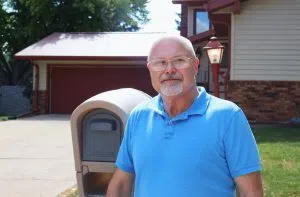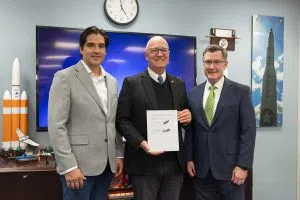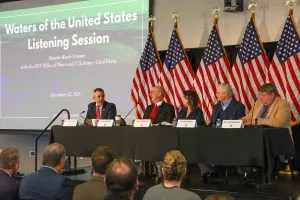
Les Witkowski of Bismarck stands in front of his home on Aug. 27, 2024. Witkowski, a retired Burleigh County chief deputy sheriff, opposes Measure 4. (Michael Achterling/North Dakota Monitor)
(Mary Steurer – North Dakota Monitor) -Supporters and opponents of a measure to abolish assessment-based property taxes in North Dakota are at loggerheads over how the proposal would affect the state’s retired population.
The ballot measure, which will go before North Dakota voters on Nov. 5, would fundamentally overhaul the state’s property tax system, which funds schools, emergency services, parks and other essential government functions.
If the proposal is approved by voters, the state would have to reimburse local governments every year by an amount no less than the property taxes those entities levy for the 2024 tax year.
Steve Moen, a retiree and Grand Forks resident, has been involved in the push to repeal assessment-based property taxes in North Dakota for about a decade. He was on the sponsoring committee that helped put the measure on the ballot.

“The way our taxes are going, if this doesn’t pass, there’s going to be a lot of elderly citizens losing their homes,” Moen said, referring to both tax and cost-of-living increases.
The Social Security Administration recently announced a 2.5% cost of living increase for 2025. The estimated average Social Security retirement benefit will increase by about $50 a month.
Moen said his property taxes have nearly doubled in the past dozen years. Back in 2012, he paid a little over $2,000 in property taxes, he said. By comparison, his property tax bill for 2023 was more than $3,500.
Moen noted that without efforts by the state government to subsidize property taxes, that figure would be much higher. He worries that his bill could suddenly skyrocket if the state decided to reduce or eliminate those subsidies.
In his view, Measure 4 is the only reliable way to keep that from happening.
“Any money that I can keep in my pocket would be a blessing to me,” he said.
Les Witkowski of Bismarck said he knows from experience that local governments rely on property taxes to function.
The retired Burleigh County chief deputy sheriff said property taxes accounted for a significant portion of his agency’s budget. He said while he’s sympathetic to the burden property taxes places on North Dakotans, he’s not convinced the measure would solve anything. He also said it’s important for governments to have a diverse tax base.
“I look at it as the price you pay to be part of society,” Witkowski said.
To Witkowski, making the state replace local tax dollars raises more questions than answers. Local governments could be forced to cut services if a large portion of their funding was indefinitely frozen at 2024 levels, he said.
“When you call 911, you want someone to answer the phone,” he said.
AARP of North Dakota has come out in opposition to the measure.
Janelle Moos, the agency’s director of advocacy, said getting rid of assessment-based property taxes would jeopardize many public programs that seniors aging in place rely on — including public transit, senior meal programs and home health care services.
“Those are all funded by locally elected boards, which is threatened by the measure,” she said.
North Dakota counties, which get a significant portion of their revenue from property taxes, in 2023 provided over $5.8 million in funding for senior centers, Moos noted.
Moos said the organization instead favors expanding funding for the North Dakota Homestead Property Tax Credit Program, which subsidizes property taxes for seniors and disabled people.
A cost estimate approved by lawmakers to appear on the November ballot pins the fiscal impact of Measure 4 at $3.15 billion for the 2025-2027 biennium. That figure was based on numbers provided by the Office of State Tax Commissioner.
Proponents of the measure have called that estimate inflated and claim the cost will actually be about $2.32 billion per two-year budget cycle.
“The state has so much money and they’re wasting it so badly,” said Moen.
A recent poll of 500 North Dakota voters commissioned by the North Dakota News Cooperative found that 40% of voters were against the measure and 28% were in favor of it. Another 33% were undecided.









